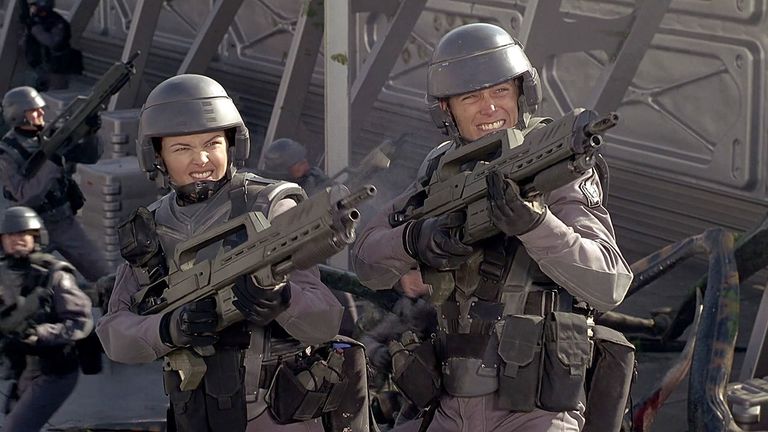
Ibn Khaldoun, a 14th-century Arab historian, once wrote, "the past resembled the future as water resembled water." While many historians may disagree with this sentiment, there are instances where certain historical situations from different periods bear a remarkable resemblance to one another. Even in Hollywood films, notorious for distorting historical and contemporary facts, there are examples of art imitating life. Starship Troopers, a 1997 science fiction spectacle directed by Paul Verhoeven, is one such film that eerily predicts the future.
Based on the famous 1959 novel by Robert A. Heinlein, a prolific and controversial author in the science fiction genre, the film depicts a future society where democracy is replaced by a militaristic meritocracy. Ed Neumeier's screen adaptation portrays a world where only those who serve in the military are considered worthy of participating in the political process. Against the backdrop of a transformed Earth, free from race and gender issues, and boasting a robust economy, the story follows Johnny Rico (played by Casper Van Dien), a young man who joins the Federal Service to impress his high school sweetheart, Carmen Ibanez (played by Denise Richards). However, their lives take a drastic turn when Buenos Aires, Rico's hometown, is destroyed by an asteroid believed to be launched from Klendathu, the home planet of the Arachnids, a race of giant spider-like aliens. Rico, along with countless other young recruits, is thrust into a brutal war where humanity's technological advancements are no match for the relentless alien onslaught.
Starship Troopers was ahead of its time, garnering both praise and criticism upon its release. Fans of the original novel were outraged by the film's departure from the source material, while audiences were taken aback by its graphic violence, nudity, and dark satire. Despite facing backlash from critics and underperforming at the box office, the film's relevance has only grown over the years.
In light of current events, Starship Troopers serves as a poignant reflection of our world. The film's futuristic universe acts as a chilling allegory for contemporary issues, highlighting the perils of militarism, propaganda, and the consequences of underestimated foes. Verhoeven's vision of a society grappling with newfound threats and moral dilemmas resonates with audiences today, underscoring the timeless relevance of the film.
Through its blend of social commentary and entertaining action sequences, Starship Troopers remains a compelling watch. The film's visual effects, though dated by today's standards, still impress with their depiction of alien creatures and futuristic landscapes. The attention to detail, from costume design to world-building, enriches the viewing experience and adds depth to the narrative.
The cast, led by Casper Van Dien and Denise Richards, delivers solid performances, capturing the transformation of characters in the face of war and adversity. The film's supporting actors, including Dina Meyer, Neil Patrick Harris, Michael Ironside, and Clancy Brown, further elevate the storytelling with their nuanced portrayals of various roles.
Despite criticism of its military tactics and portrayal of warfare, Starship Troopers offers a sobering reminder of the complexities of conflict and the human cost of war. By exploring themes of propaganda, sacrifice, and the blurred lines between heroism and villainy, the film invites audiences to reflect on the darker aspects of humanity.
In conclusion, Starship Troopers is a masterful blend of science fiction and social commentary, offering a thought-provoking narrative that remains relevant to this day.
Rating: 9/10 (++++)
(Note: This review was originally posted in the Usenet newsgroup rec.arts.films.reviews on July 6th, 2004)
Connect with the author:
Support the author:
- Rising Star game referral link
- BTC donations: 1EWxiMiP6iiG9rger3NuUSd6HByaxQWafG
- ETH donations: 0xB305F144323b99e6f8b1d66f5D7DE78B498C32A7